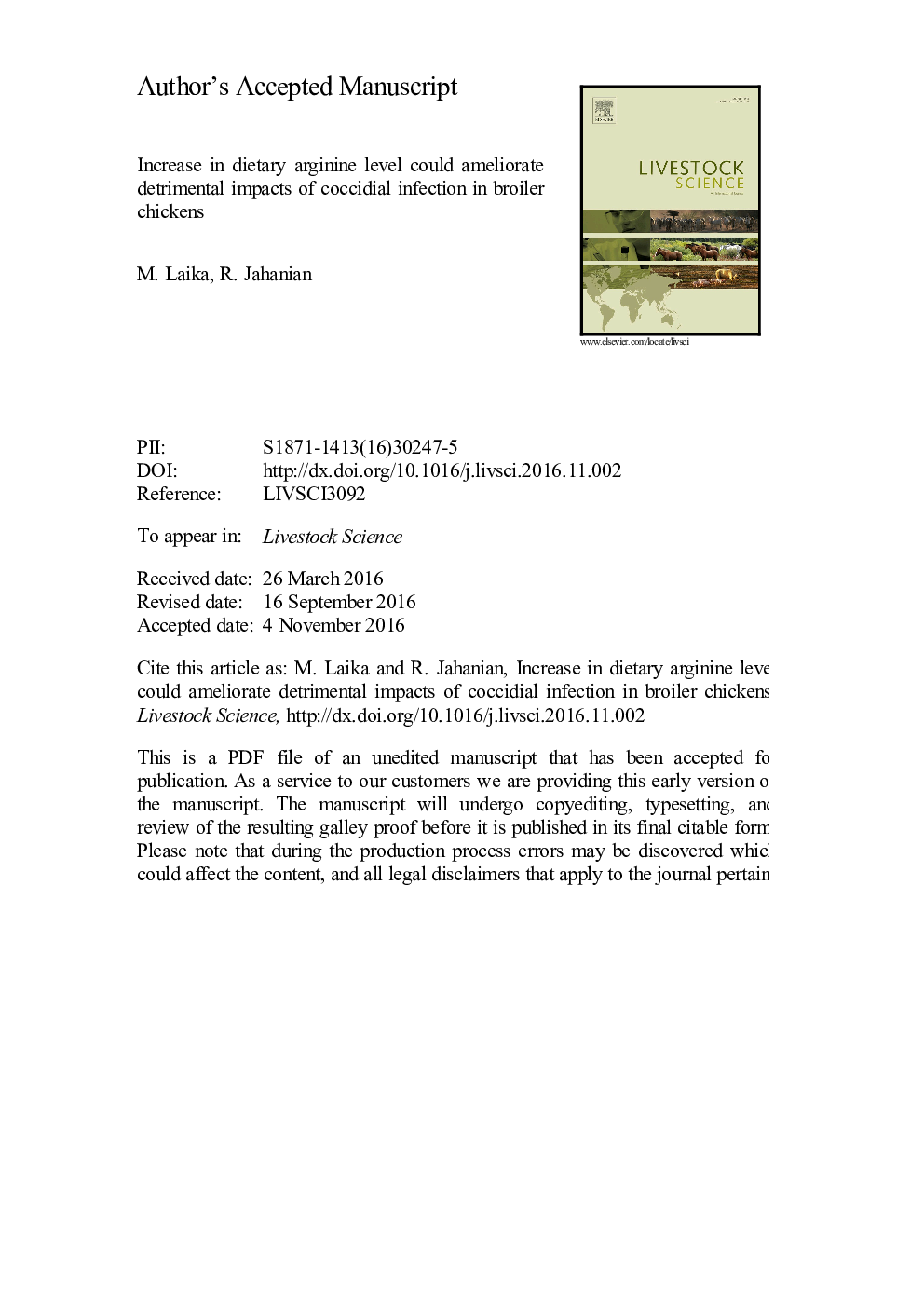| Article ID | Journal | Published Year | Pages | File Type |
|---|---|---|---|---|
| 5543162 | Livestock Science | 2017 | 27 Pages |
Abstract
The present study was conducted to investigate the effect of dietary supplementation of Arg on growth performance, carcass characteristics, and morphological indices of jejunal epithelial cells in coccidia-challenged broiler chickens. A total of 288 one-day-old broiler chickens were randomly distributed among 3 experimental treatments with 8 replicate pens of 12 broiler chickens each. Experimental treatments consisted of the graded levels of dietary Arg (100, 105, and 110% of the standard recommendations during different growth periods). From 16 to 20 d of age, half of the replicate pens of each dietary Arg level were orally challenged with a mixture of Eimeria species (acervulina, tenella, maxima, and necatrix). Results showed that dietary Arg had no marked effect on average daily feed intake (ADFI) and gain (ADG) during the starter (0 to 14 d of age) and grower (14 to 28 d of age) periods. Although ADFI wasn't affected by coccidial challenge, ADG of Eimeria-challenged broiler chickens were lower (P<0.05) than those of uninfected ones during both grower and finisher periods. Dietary supplementation of 105 and 110% of Arg, however, prevented depressed ADG in coccidia-infected broiler chickens during the finisher period (28 to 42 d of age) compared with 100% of Arg (ArgÃcoccidiosis, P<0.05). Coccidial challenge increased (P<0.01) feed conversion ratio (FCR), while 110% of Arg supplementation improved (P<0.05) FCR values during both grower and finisher periods. Although coccidial challenge increased FCR value in control broiler chickens (100% of Arg), dietary Arg supplementation of 105 and 110% improved FCR values during the grower period, resulted in an ArgÃcoccidiosis interaction (P<0.01). Subjecting the broiler chickens to coccidiosis reduced liver weight (P<0.001) and carcass yield (P<0.05). Dietary Arg supplementation increased (P<0.001) villi height (VH) to crypt depth (CD) ratio. On the other hand, both VH and VH to CD ratio were decreased (P<0.001) in coccidial-infected broiler chickens. Although subjecting the broiler chickens to coccidiosis increased (P<0.001) muscular layer thickness (MLT) of jejunum, supplemental Arg of 110% resulted in a decrease (P<0.01) in jejunal MLT. In addition, supplemental Arg reduced (P<0.05) fecal oocyst count, with the lowest count assigned to the broiler chickens fed 110% of Arg. Dietary Arg supplementation of 110% improved morphological indices in coccidia-challenged broiler chickens, while it had no obvious impact in untreated ones, resulted in the ArgÃcoccidiosis interactions (P<0.05). The present findings showed that supplementing the diets with Arg above the recommended values could ameliorate negative effects of Eimeria on growth performance and morphological indices of broiler chickens.
Keywords
Related Topics
Life Sciences
Agricultural and Biological Sciences
Animal Science and Zoology
Authors
M. Laika, R. Jahanian,
